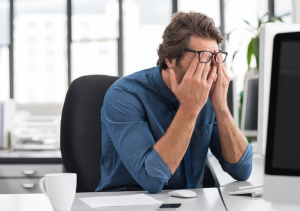 Today, look around you and one of the common denominators you are likely to see is that most people have their eyes glued to some sort of screen, whether it be a phone, tablet, computer, or television. If we stop and think about it, it might actually be a little shocking at just how much of our time is spent in front of a screen of some sort.
Today, look around you and one of the common denominators you are likely to see is that most people have their eyes glued to some sort of screen, whether it be a phone, tablet, computer, or television. If we stop and think about it, it might actually be a little shocking at just how much of our time is spent in front of a screen of some sort.
Setting aside any of the potential social problems new technology has presented us with, are there any real problems with all this screen time? It turns out that there can be. One of the parts of our bodies that pays the biggest price for this new love of technology is our eyes.
We have heard about problems associated with eye strain and computers for years. The thing is, in the past, a lot of us worked on computers as a part of our job and watched television at home, but there was a lot more time spent not looking at a screen. Today, once we get home from work, chances are we will be glued to a screen for most of the night.
This has led to an increase in a wide range of different complaints associated with the optics and vision. Eye strain can lead to headaches, dryness of the eyes, blurred vision, and it can even make you tired. This is because the eye isn’t used to focusing on something like a screen for such a vast portion of the day and this leads to strain.
When the eyes don’t get a break, they get fatigued, just as any much that is constantly used without reprieve would. This fatigue has a wide range of different manifestations. The culprit is the high-energy visible light or blue light that most screens are backlit with.
There is a growing body of research that shows that blue light can irritate the eyes and may even present a long-term risk of damage to your retina. Dryness results from the reduced amount of blinking that we tend to do when we are looking at a screen.
The best thing you can do is not throw away all your devices. Rather, be sure to take a break every now and again and let your eyes have a rest. A lot of devices now have what is called a nighttime mode that changes the color of the backlight on your device so it doesn’t emit blue light. This has been shown to be easier on your eyes, especially in low or no light, and won’t cause as many sleeping issues as blue light seems to.
If you are experiencing headaches or eye problems, please visit www.ipalc.org/find to locate an optometrist in your area who can help.
Share on Facebook



 Southwest Florida Medicine.com is dedicated to bringing you the very best health information available today!
Subscribe or check back regularly!
Southwest Florida Medicine.com is dedicated to bringing you the very best health information available today!
Subscribe or check back regularly!